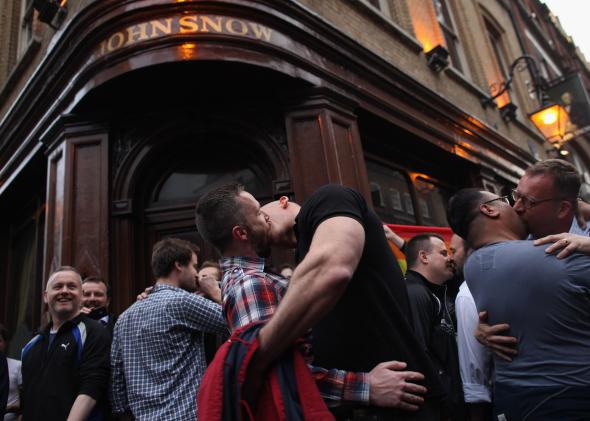Same-sex marriage arrives in England and Wales next weekend, with the first gay weddings being celebrated on Saturday, March 29. To mark the occasion, Richard Coles—a classic British eccentric who is a Church of England parish priest, a former member of the bands Bronski Beat and the Communards, and an openly gay man—presented a wonderful BBC radio documentary about how the struggle for marriage equality played out on that side of the Atlantic.
Gay Rights: Tying the Knot, which you can listen to at the BBC website for another 10 days or so, is a great piece of radio. It’s also a superb primer on the differences between Britain and America, two places that often seem very similar but are incredibly different in certain key ways.
The evolution Coles chronicles in the 30-minute documentary will be familiar to transatlantic listeners—it begins with secrecy, shame, and blackmail, and builds through a series of personal breakthroughs and comings out, the creation of a fringe political movement by strident activists, the devastating impact of AIDS on the community, the morphing of grass-roots LGBTQ organizations into conservative institutions, and gradual social acceptance. What might surprise Americans is the part where politicians—including a prime minister from the Conservative Party—push for gay marriage, while some leading gay rights groups drag their feet or actively oppose the development, feeling that civil partnerships, which have been available since 2005, are preferable.
When Coles asks Ben Summerskill, the departing chief executive of Stonewall, Britain’s leading mainstream LGBTQ rights group, why the group didn’t originally support marriage equality, the answer is a mixture of institutional mumbo-jumbo—leadership didn’t want to take a stand before a survey of members’ attitudes to marriage was complete—and a reflection of its radical roots: For some Stonewall activists, especially lesbians, marriage was a tired old heterosexist institution they’d been battling for decades. (I can relate.) Coles doesn’t speak to Prime Minister David Cameron, whose government introduced the marriage-equality legislation, nor does he paint an exaggerated portrait of the PM as a civil-rights warrior who defied the old-school social conservatives in his party, though that backlash did materialize. Still, the Conservative leadership’s push for gay marriage strikes me as one of the rare occasions where the British ruling class’s patronizing habit of ignoring public opinion and doing what it thinks is right ends up being a positive force. (Opposition to the death penalty, which is quite popular with the British general public, is another.) That just doesn’t happen in the United States—unless you’re watching Downton Abbey.
Best of all, the documentary ends on a galvanizing note when a young gay couple describe their families’ negative reactions to their coming out and report that outside England’s urban centers homophobia is still rampant. It’s good to be reminded that even in a country where gay marriage is legal and the most popular TV personality is an out lesbian (Britain’s Ellen DeGeneres is sports broadcaster Clare Balding), there are many battles still to be fought.
